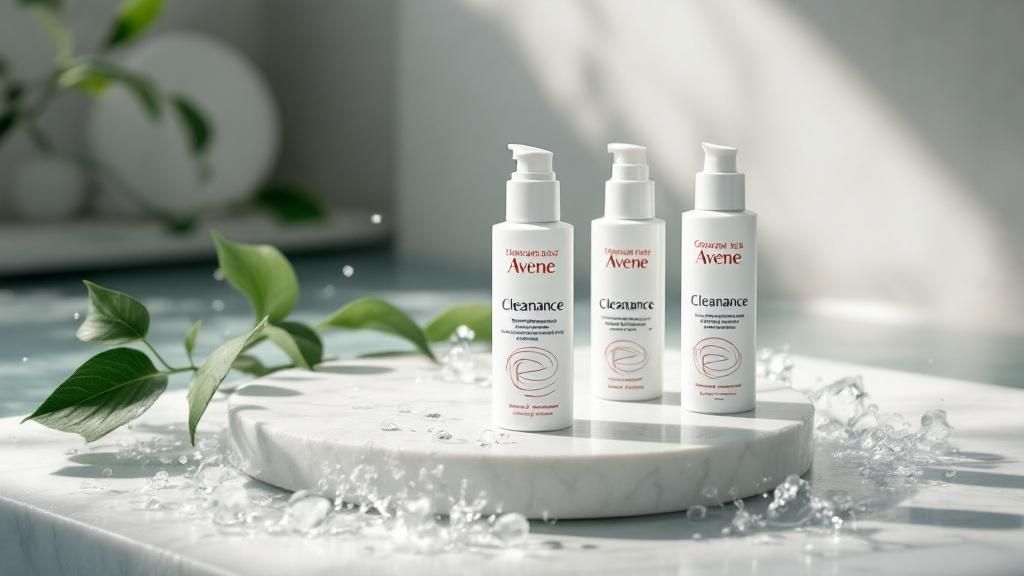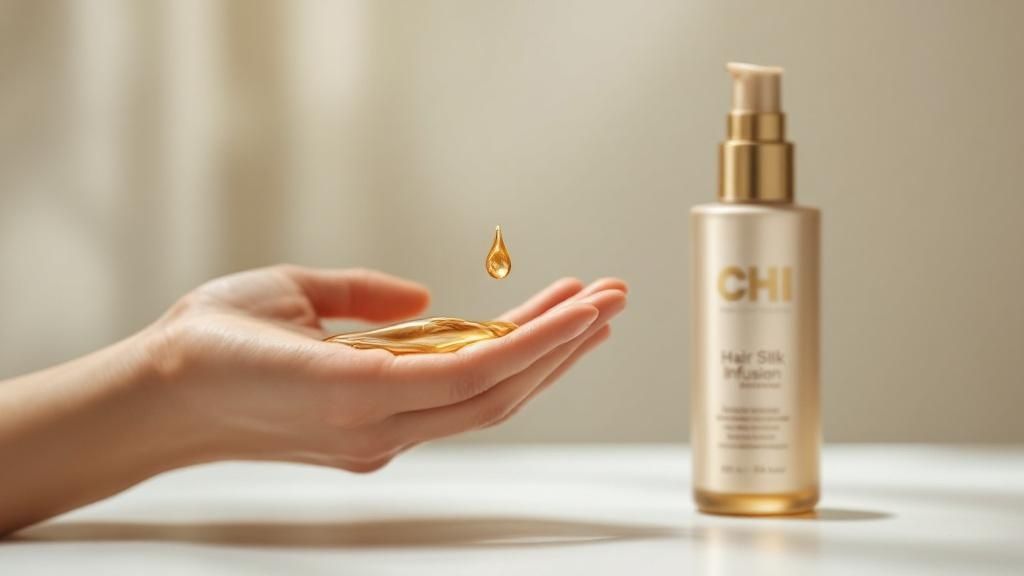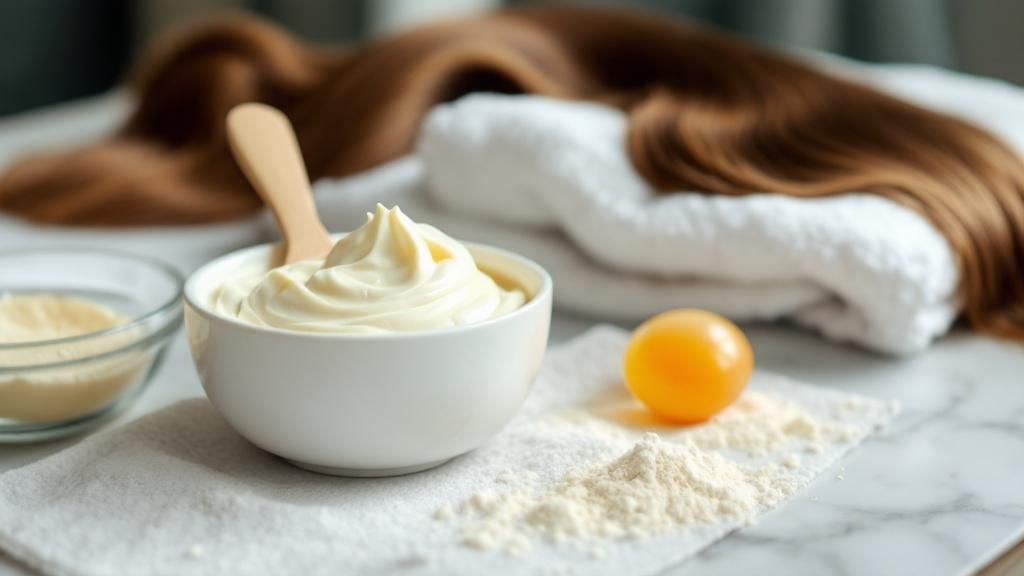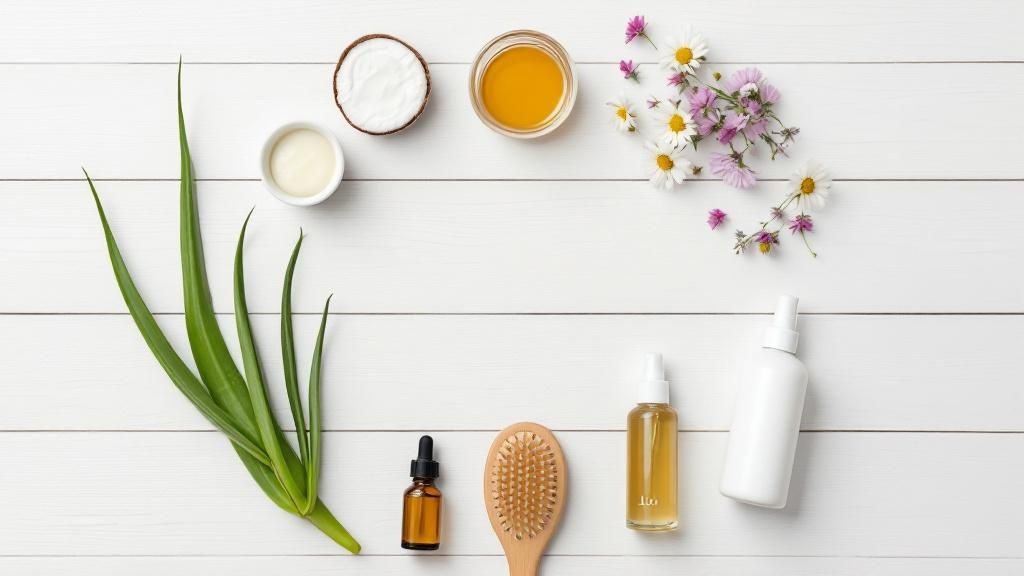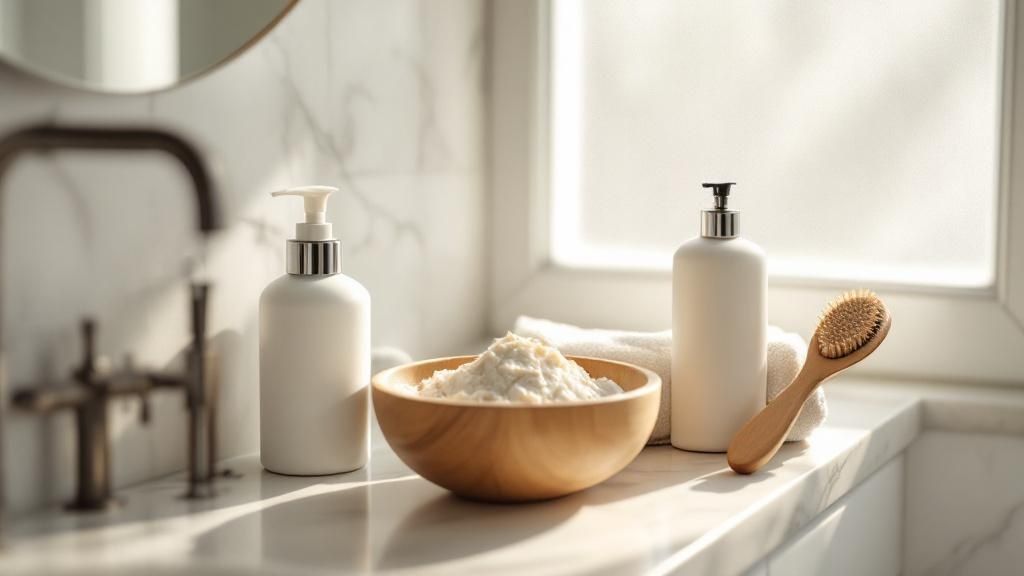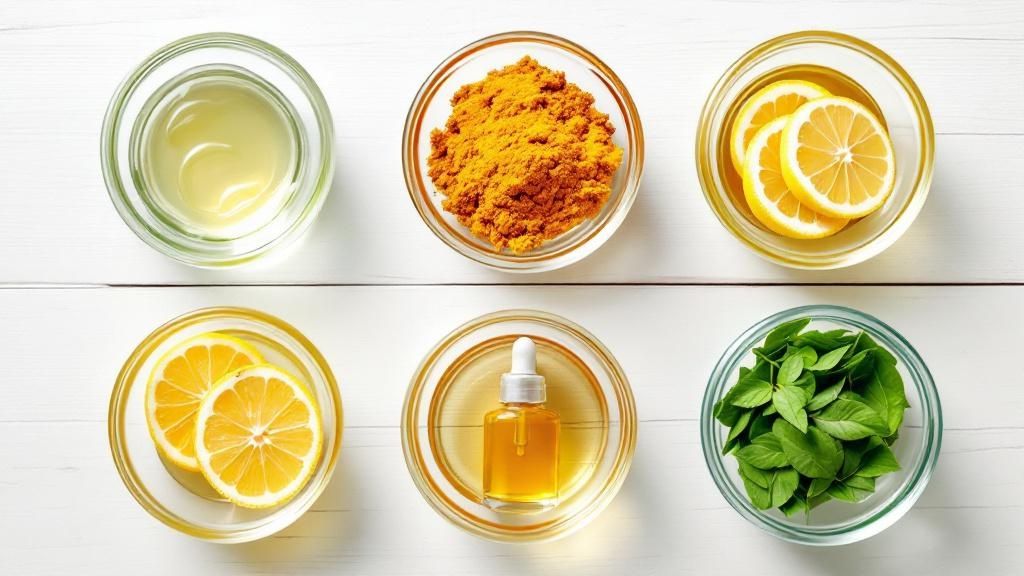
7 Natural Remedies for Acne Scars That Actually Work in 2025
The journey with acne often continues long after a blemish has healed, leaving behind persistent marks and scars. While professional treatments are an option, many seek gentler, more accessible solutions found in nature. This guide is designed to cut through the noise, focusing on the most effective natural remedies for acne scars and providing a realistic look at what they can achieve. We will explore ingredients backed by evidence, detailing how to use them correctly for optimal results.
Understanding the type of scar you have, whether it’s a discoloured mark (post-inflammatory hyperpigmentation) or a textured indentation (atrophic scar), is crucial. This knowledge helps you select the most suitable remedy. Ingredients rich in antioxidants can brighten discolouration, while others that promote collagen production may help improve shallow depressions.
This article provides a straightforward roadmap for integrating powerful botanicals like rosehip oil, aloe vera, and manuka honey into your skincare routine. We will cover specific application methods, benefits, and important precautions for each. With consistency and patience, these natural approaches offer a hopeful path towards achieving smoother, clearer-looking skin.
1. Rosehip Oil
Extracted from the seeds of wild rose bushes, rosehip oil stands out as a powerful, non-greasy emollient celebrated for its remarkable skin-regenerating properties. Unlike fragrant rose essential oil, rosehip oil is a carrier oil rich in essential fatty acids like linoleic and linolenic acid, antioxidants, and, most notably, trans-retinoic acid (a natural form of vitamin A). This composition makes it one of the most effective natural remedies for acne scars.
The natural retinoids in rosehip oil work by accelerating skin cell turnover, encouraging old, scarred skin cells to be shed and replaced with new, healthy ones. This process helps to gradually diminish the appearance of post-inflammatory hyperpigmentation (dark spots) and atrophic scars (indented scars). Furthermore, its high concentration of vitamins C and E supports collagen and elastin production, which is crucial for rebuilding the skin's structure and improving scar texture.
Why It Works for Acne Scars
Rosehip oil’s strength lies in its dual-action approach: it targets both discolouration and texture. Its fatty acids help repair the skin's moisture barrier, reducing inflammation and creating an optimal environment for healing. This is particularly beneficial for scars that are red or irritated.
A notable 2015 clinical study demonstrated significant improvements in post-surgical scars after 12 weeks of consistent rosehip oil application. Participants saw reductions in both erythema (redness) and atrophy, confirming its efficacy in skin regeneration. Its popularity is further bolstered by endorsements from skincare experts like dermatologist Dr. Dray and its status as a reported beauty staple for figures like Kate Middleton.
The following summary box highlights the key data points that underscore its effectiveness.
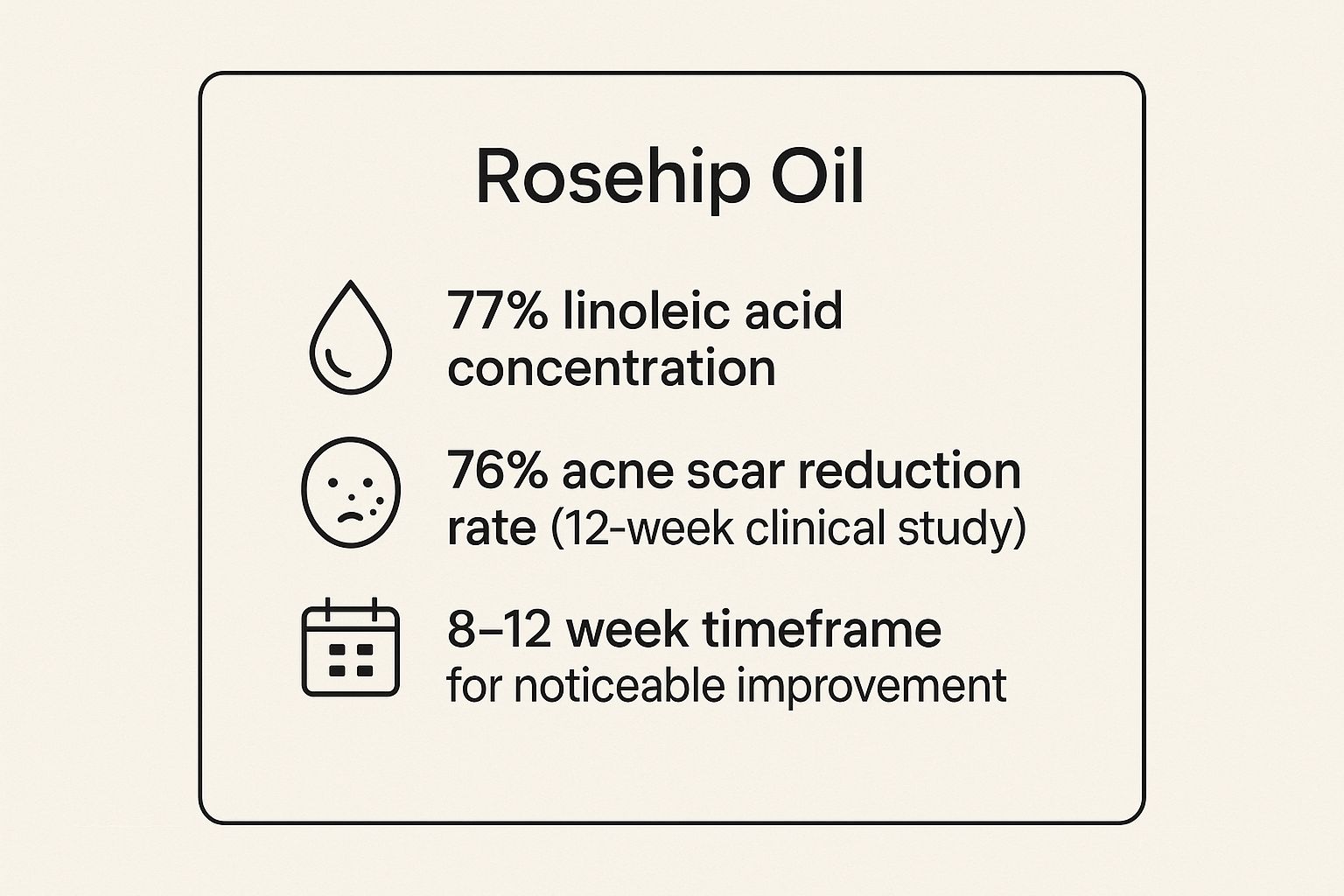
These figures illustrate that with consistent use over two to three months, users can expect tangible improvements in scar appearance due to the oil’s potent composition.
How to Use Rosehip Oil
To incorporate this remedy into your routine, follow these simple steps:
- Choose Wisely: Opt for organic, cold-pressed varieties. This method of extraction preserves the oil’s delicate nutrients, ensuring maximum potency.
- Application: After cleansing and toning at night, dispense 2-3 drops into your palm. Gently press the oil onto your face, focusing on scarred areas. Follow with your regular moisturiser.
- Consistency is Key: Use it nightly for the best results. If you have sensitive skin, start by applying it every other night to build tolerance.
- Proper Storage: Keep your rosehip oil in a cool, dark place, or even in the refrigerator, to prevent oxidation and extend its shelf life.
2. Aloe Vera Gel
Hailed as the "plant of immortality" by ancient Egyptians, aloe vera gel is a botanical powerhouse extracted from the succulent leaves of the aloe plant. It contains over 75 active compounds, including vitamins, enzymes, amino acids, and polysaccharides like acemannan. This rich composition promotes wound healing, soothes inflammation, and stimulates collagen synthesis, making it one of the most revered natural remedies for acne scars, particularly for newer, redder marks.
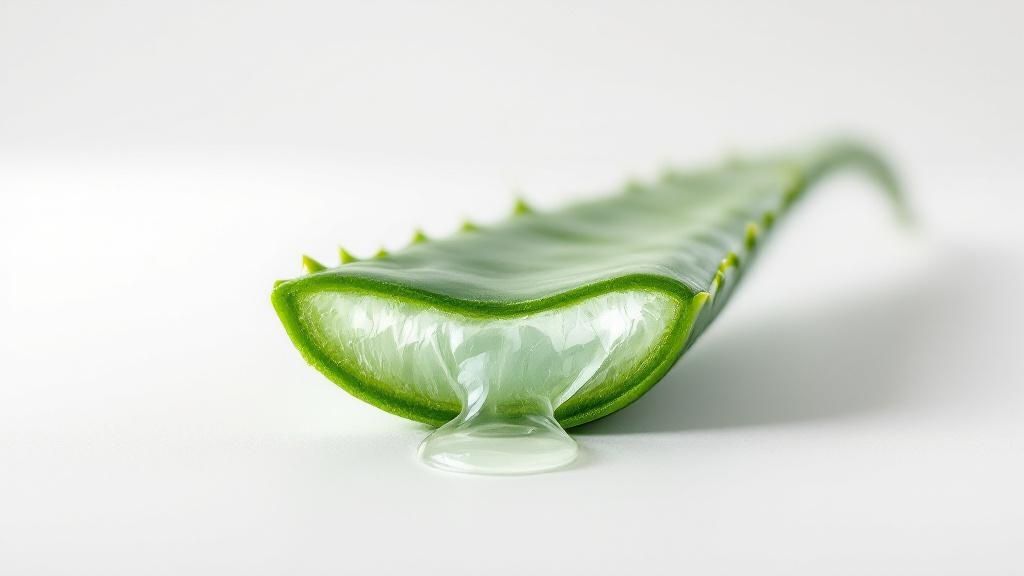
The primary mechanism behind aloe vera's effectiveness is its ability to boost fibroblastic activity and collagen production. This helps to accelerate the healing of damaged skin tissue left behind by acne. Its key compounds, aloesin and aloin, also inhibit the overproduction of melanin, which helps to lighten post-inflammatory hyperpigmentation and prevent dark spots from forming.
Why It Works for Acne Scars
Aloe vera's strength is in its anti-inflammatory and regenerative properties, making it ideal for calming fresh breakouts and healing the immediate aftermath. By reducing inflammation, it helps prevent a more severe scar from developing in the first place. Its moisturising properties also keep the skin supple, creating an optimal environment for the scar remodelling process.
Scientific evidence supports its use. A 2014 study found that applying a combination of aloe vera gel and tretinoin cream was significantly more effective at healing acne lesions and reducing erythema than tretinoin alone. Its long history of use in traditional medicine and modern burn units further demonstrates its profound skin-healing capabilities. Brands like Seven Minerals and Lily of the Desert have gained popularity for their pure aloe vera gel, with countless users reporting improvements in acne scars.
The following summary box highlights the key factors that underscore its effectiveness.
Key Factors:
- Active Compound: Contains aloesin, which helps reduce hyperpigmentation.
- Clinical Support: Proven to enhance the effects of conventional acne treatments.
- Primary Action: Accelerates wound healing and reduces inflammation.
These elements illustrate how aloe vera serves as both a preventative and a healing agent, making it a staple for anyone looking to manage acne and its residual marks. You can discover more about its benefits for scar fading on Lola Beauty Shop.
How to Use Aloe Vera Gel
To integrate this soothing remedy into your skincare routine, follow these steps:
- Choose Wisely: Select a gel that is at least 99% pure aloe vera. Avoid products with added alcohol, colours, or fragrances, which can irritate sensitive or broken skin.
- Application: After cleansing, apply a thin layer of aloe vera gel directly to the scarred areas or your entire face. Allow it to dry completely. It can be used 2-3 times daily.
- Consistency is Key: For best results, apply it consistently, especially on fresh scars. It works well as a light, non-comedogenic moisturiser for acne-prone skin.
- Proper Storage: Keep pure aloe vera gel in the refrigerator. The cool temperature provides an extra soothing effect upon application and helps preserve its active compounds.
3. Vitamin E Oil
A long-standing staple in traditional skincare, Vitamin E oil is a potent, fat-soluble antioxidant renowned for its role in skin repair and protection. It primarily functions by neutralising free radicals, the unstable molecules that contribute to cellular damage and impede the skin's healing process. This protective action, combined with its ability to deeply moisturise and support cell regeneration, makes it a classic choice among natural remedies for acne scars.
The primary active form of Vitamin E, tocopherol, helps to strengthen the skin barrier and improve moisture retention. This creates a healthier, more resilient environment for scar tissue to remodel itself. By enhancing skin elasticity and promoting the growth of new, healthy skin cells, Vitamin E oil can gradually help soften the texture and reduce the discolouration of various scar types over time.
Why It Works for Acne Scars
Vitamin E oil’s efficacy for scars is rooted in its profound antioxidant and moisturising properties. It protects the delicate, healing skin from oxidative stress, which can otherwise worsen scarring and hyperpigmentation. Its thick, emollient texture provides an occlusive barrier, locking in moisture and allowing the skin's natural repair mechanisms to function optimally.
Its use is widely established within the medical community, often recommended by plastic surgeons to aid the healing of post-procedural scars. Brands like Jason Natural Products, which pioneered topical Vitamin E oil, have built their reputation on its effectiveness for scar treatment. While scientific studies on its direct impact on acne scars are mixed, decades of anecdotal evidence and dermatological recommendations support its use for improving skin texture and overall healing.
How to Use Vitamin E Oil
To effectively integrate this powerful antioxidant into your scar care routine, follow these guidelines:
- Choose Wisely: Look for pure Vitamin E oil that specifies its form as d-alpha-tocopherol. This is the natural, most bioavailable form, as opposed to the synthetic dl-alpha-tocopherol version.
- Application: Because it is thick and potent, it's best used as a spot treatment at night. After cleansing, apply a very small amount directly onto the scars. Gently massage it in until it's partially absorbed.
- Consistency is Key: Apply it nightly to targeted areas. If you have oily or acne-prone skin, consider mixing a single drop with a lighter, non-comedogenic oil (like jojoba oil) to prevent potential breakouts.
- Enhance Absorption: Applying the oil to slightly damp skin can help improve absorption and spreadability. Due to its richness, it is best reserved for your nighttime routine.
4. Honey (Raw/Manuka)
Prized for millennia in traditional medicine, honey, especially raw and Manuka varieties, is a potent natural healer for the skin. It's more than just a sweetener; it's a complex substance brimming with antibacterial, anti-inflammatory, and regenerative compounds. Unlike processed honey, raw honey is unheated and unfiltered, preserving its powerful enzymes, amino acids, and antioxidants that make it an effective natural remedy for acne scars.
The secret to its scar-fading ability lies in its unique biochemical makeup. Raw honey contains glucose oxidase, an enzyme that produces small amounts of hydrogen peroxide, which helps to lighten hyperpigmentation and sanitise the skin. Manuka honey, sourced from the nectar of the Manuka tree in New Zealand, is even more powerful due to its high concentration of Methylglyoxal (MGO). This compound provides superior antibacterial action and promotes wound healing by stimulating the growth of new, healthy tissue. Its natural humectant properties also draw moisture into the skin, keeping it hydrated and supple for optimal repair.
Why It Works for Acne Scars
Honey’s efficacy for acne scars stems from its multi-pronged healing strategy. It actively reduces inflammation and bacterial activity, preventing new breakouts that could lead to more scars. Simultaneously, its gentle exfoliating properties, derived from natural gluconic acid, help slough away dead skin cells, revealing a smoother, more even-toned complexion underneath. This dual action of calming the skin while encouraging regeneration is crucial for treating both new and old marks.
Medical-grade honey is routinely used in clinical settings for wound care, a testament to its scientifically validated healing power. Premium brands like Wedderspoon and Comvita popularised Manuka honey for at-home use, with users widely reporting significant improvements in overall skin texture and a reduction in post-acne marks. Its ability to create a moist, protective barrier makes it ideal for healing delicate skin.
The video above demonstrates a simple DIY honey mask, a popular and effective application method. For those seeking other clinically proven options for scar care, exploring specialised scar treatments can complement a natural routine.
How to Use Honey
To leverage honey's benefits for your skin, follow these guidelines:
- Choose Wisely: Select raw, unprocessed honey for general use. For enhanced therapeutic benefits, opt for Manuka honey with a UMF (Unique Manuka Factor) rating of 10+ or an MGO rating of at least 263+.
- Application: Apply a thin layer of honey directly to cleansed, damp skin, focusing on scarred areas. Leave it on as a mask for 15-20 minutes.
- Consistency is Key: Use this treatment 2-3 times per week for noticeable results. You can mix it with a small amount of colloidal oatmeal for added gentle exfoliation.
- Proper Removal: To remove, rinse your face with warm water. Use a soft, damp cloth to gently wipe away any remaining residue without irritating the skin.
5. Tea Tree Oil
Extracted from the leaves of the native Australian Melaleuca alternifolia plant, tea tree oil is a potent essential oil renowned for its powerful antimicrobial and anti-inflammatory properties. Its primary active compound, terpinen-4-ol, is responsible for its effectiveness against acne-causing bacteria. While celebrated for treating active breakouts, its ability to calm inflammation and prevent new blemishes makes it an excellent preventative tool, positioning it among the key natural remedies for acne scars.
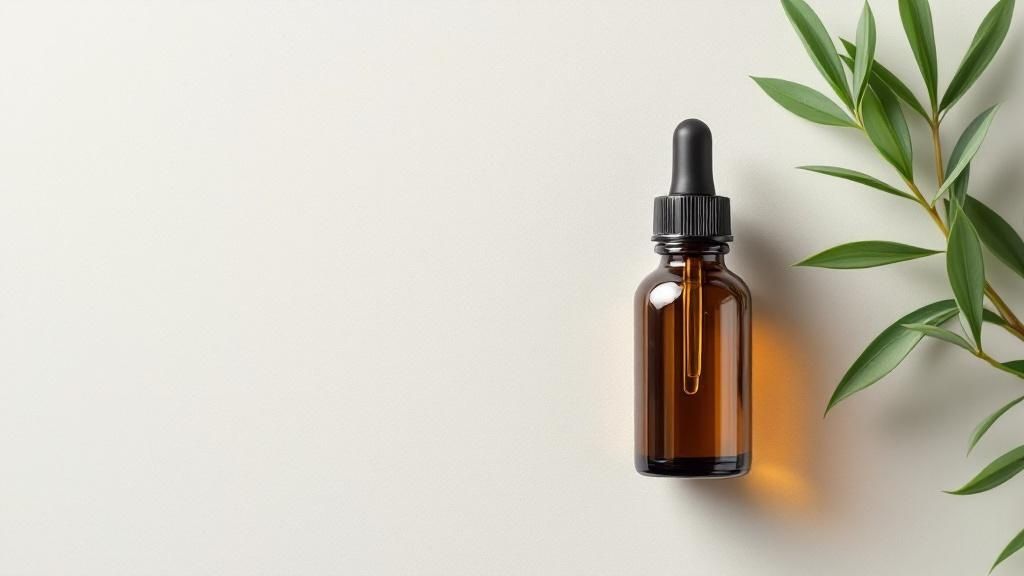
By tackling acne at its source, tea tree oil helps prevent the severe inflammation that often leads to post-inflammatory hyperpigmentation and atrophic scarring. For existing scars, its anti-inflammatory action can reduce redness and swelling, making the marks less noticeable and creating a better environment for the skin to heal naturally.
Why It Works for Acne Scars
Tea tree oil’s main contribution to scar management is preventative. By controlling active acne, it minimises the risk of new scars forming. Its efficacy is well-documented; clinical studies have shown that a 5% tea tree oil gel can be as effective as a 5% benzoyl peroxide lotion, but with fewer side effects like dryness and irritation.
Its historical use in Aboriginal Australian traditional medicine and its modern commercial popularisation by brands like The Body Shop and Thursday Plantation underscore its long-standing reputation. This history, combined with clinical support, confirms its role in a comprehensive acne and scar treatment plan. While it doesn't directly rebuild collagen like rosehip oil, its preventative and calming benefits are invaluable.
How to Use Tea Tree Oil
Proper dilution is crucial to avoid skin irritation. Follow these steps for safe application:
- Dilute Correctly: Never apply pure tea tree oil directly to the skin. Dilute it to a 5% concentration by mixing 5 drops of tea tree oil with 95 drops of a carrier oil (like jojoba or almond oil) or an unscented moisturiser.
- Spot Treatment: Use a cotton bud to apply the diluted mixture directly onto active pimples or inflamed scars. This targeted approach is safer than all-over application.
- Choose Quality: Opt for 100% pure, therapeutic-grade tea tree oil to ensure it contains the necessary active compounds and is free from additives.
- Be Consistent: Apply it once or twice daily to active blemishes to reduce their lifespan and severity. For a ready-made solution with salicylic acid, you can explore products like this blemish control gel.
6. Lemon Juice
A staple in traditional home remedies, fresh lemon juice is often cited for its skin-brightening capabilities. Its potency comes from its high concentration of citric acid, a type of alpha-hydroxy acid (AHA), and ascorbic acid (vitamin C). This combination allows it to act as a natural exfoliant, helping to slough off the top layer of skin cells and lighten areas of hyperpigmentation. This makes it a popular, albeit potent, choice among natural remedies for acne scars.
The citric acid works by dissolving the bonds that hold dead skin cells together, promoting cellular turnover and revealing newer, less pigmented skin underneath. Simultaneously, the vitamin C content acts as an antioxidant, helping to protect the skin from further damage and theoretically supporting collagen synthesis. This dual-action approach can help fade dark spots and slightly improve skin texture over time, which explains its long-standing popularity in DIY skincare circles.
Why It Works for Acne Scars
Lemon juice’s primary benefit for acne scars is its ability to target post-inflammatory hyperpigmentation (the dark marks left after a pimple heals). Its AHA properties accelerate the fading process by chemical exfoliation. This is why many before-and-after photos shared on DIY beauty blogs and social media show a visible lightening of dark spots, though results can vary significantly and require cautious application.
It is one of the most accessible and low-cost options available, deeply rooted in folk medicine practices across many cultures. Its effectiveness is purely anecdotal, however, and it's crucial to acknowledge its potential for irritation. Unlike formulated skincare products, the concentration of acid in a fresh lemon is unregulated, making it a powerful but unpredictable ingredient that must be handled with extreme care to avoid adverse effects like chemical burns or increased sun sensitivity.
How to Use Lemon Juice
Due to its high acidity, proper application is non-negotiable to prevent skin damage. Follow these steps meticulously:
- Dilution is Mandatory: Never apply pure lemon juice to your skin. Always dilute it with an equal amount of water to reduce its potency and lower the risk of irritation.
- Fresh is Best: Use freshly squeezed juice, not bottled varieties, which often contain preservatives and have a lower vitamin C content due to oxidation.
- Patch Test First: Before applying to your face, test a small amount of the diluted mixture on a discreet area of skin, like behind your ear or on your inner arm. Wait 24-48 hours to check for any signs of redness, itching, or burning.
- Night-Time Application Only: Apply a small amount of the diluted juice with a cotton bud directly onto the scars. Leave it on for no more than 10 minutes before rinsing thoroughly. Lemon juice makes your skin highly photosensitive, so only use it at night and be diligent about applying a broad-spectrum SPF 30+ sunscreen every morning.
- Moisturise Immediately: After rinsing, follow up with a gentle, hydrating moisturiser to counteract the drying effects of the acid and support your skin’s barrier.
7. Coconut Oil
Virgin coconut oil, extracted from the fresh meat of mature coconuts, is a highly moisturising fat known for its rich profile of fatty acids, particularly lauric and capric acid, alongside vitamin E. Its traditional use in skincare stems from its potent antimicrobial and anti-inflammatory properties. While it has a reputation for supporting skin barrier function and aiding wound healing, it remains one of the more controversial natural remedies for acne scars due to its high comedogenic rating.
The potential benefit of coconut oil for scars lies in its ability to deeply moisturise the skin and reduce inflammation. Healthy, hydrated skin heals more efficiently. The lauric acid content helps combat bacteria that could otherwise impede the healing process, while its emollient nature softens the skin, which may help improve the texture of newly formed scars over time.
Why It Works for Acne Scars
Coconut oil's primary mechanism is supportive rather than corrective. It creates a protective, occlusive barrier on the skin that locks in moisture and protects the delicate scar tissue from environmental stressors. This helps maintain an optimal healing environment. Its anti-inflammatory effects can also help soothe the redness and irritation associated with fresh acne marks.
However, its effectiveness is highly debated within acne-focused communities. While some users with drier skin types report positive results in softening their skin, many with oily or acne-prone skin find it clogs pores and worsens breakouts. Brands like Spectrum Organics and Nutiva popularised virgin coconut oil for skincare, but its suitability is strongly dependent on individual skin type and a cautious approach.
How to Use Coconut Oil
Given its controversial nature, proper application is crucial to minimise risks and potentially harness its benefits:
- Choose Wisely: Always opt for virgin, cold-pressed, organic coconut oil. This ensures it is unrefined and retains its natural therapeutic compounds without added chemicals.
- Patch Test First: This is non-negotiable. Before applying it to your face, test a small amount on an inconspicuous area, like behind your ear or along your jawline, for several days to check for pore-clogging or irritation.
- Apply Sparingly: Use a very small amount and warm it between your fingertips until it melts. Gently pat it onto targeted scarred areas rather than slathering it over your entire face. It is best used as a spot treatment for scars on drier, less acne-prone areas of the body.
- Consider for Drier Skin: This remedy is generally better suited for individuals with dry or combination skin who are not actively breaking out. If you have oily, acne-prone skin, it is best to avoid this remedy in favour of non-comedogenic oils.
Natural Remedies for Acne Scars: 7-Item Comparison
| Item | Implementation Complexity 🔄 | Resource Requirements 💡 | Expected Outcomes ⭐📊 | Ideal Use Cases 💡 | Key Advantages ⚡ |
|---|---|---|---|---|---|
| Rosehip Oil | Moderate - requires consistent nightly use | High-quality cold-pressed oil, refrigeration recommended | High effectiveness over 8-12 weeks; proven scar reduction | Long-term scar fading, wrinkles, dryness | Natural retinoids, lightweight, multi-functional |
| Aloe Vera Gel | Low - easy multi-daily application | Affordable, widely available pure gel | Gradual wound healing and inflammation reduction | Fresh scars, sensitive/irritated skin | Immediate soothing, gentle, prevents breakouts |
| Vitamin E Oil | Low to moderate - sparing use recommended | Accessible and affordable oil | Moisturizing with limited direct scar evidence | Dry, mature skin needing barrier repair | Powerful antioxidant; good combined treatment |
| Honey (Raw/Manuka) | Low - simple mask or spot treatment | High-quality Manuka can be expensive | Hydration, antibacterial action, gentle exfoliation | Scar prevention, wound healing, all skin types | Natural antibacterial; suitable for daily use |
| Tea Tree Oil | Moderate - must be diluted and spot applied | Pure, therapeutic-grade oil needed | Prevents new acne; reduces inflammation but limited scar evidence | Active acne prevention, inflamed scars | Potent antimicrobial; good benzoyl peroxide alternative |
| Lemon Juice | High risk - careful dilution essential | Easily available fresh lemons | Skin brightening, exfoliation; risk of irritation | Post-inflammatory hyperpigmentation (with caution) | Natural AHA and vitamin C for brightening |
| Coconut Oil | Low - simple application but caution needed | Affordable virgin coconut oil | Moisturizing; possible acne worsening | Dry skin needing nourishment (avoid acne-prone skin) | Deeply moisturizing; antimicrobial properties |
Crafting Your Personalised Scar-Fading Ritual
Navigating the world of natural remedies for acne scars is an empowering journey toward reclaiming your skin's health and radiance. As we have explored, nature offers a potent arsenal of ingredients, from the regenerative power of rosehip oil to the soothing touch of aloe vera and the clarifying properties of tea tree oil. The true secret to success, however, is not found in a single "miracle" cure but in creating a consistent, personalised ritual that respects your skin's unique needs.
The path to smoother skin is a marathon, not a sprint. It demands patience and a mindful approach. Rather than overwhelming your skin by trying every remedy at once, select one or two that resonate with your specific scar type, whether you are dealing with post-inflammatory hyperpigmentation or minor textural changes. Remember the foundational rule: always patch-test a new ingredient on a small, discreet area of skin to ensure it does not cause irritation or an adverse reaction.
Building a Holistic Framework for Success
While these topical applications are powerful, they work best when supported by a holistic lifestyle that promotes skin healing from the inside out. Think of these practices as the essential framework that allows your chosen natural remedies to perform optimally.
- Sun Protection is Non-Negotiable: Many of the ingredients discussed, such as lemon juice and even vitamin E, can heighten your skin's sensitivity to the sun. Daily application of a broad-spectrum SPF is crucial not only to prevent this photosensitivity but also to stop existing scars from darkening and becoming more prominent. This is the single most important step in any scar-fading routine.
- Prevent Future Scarring: The best way to treat acne scars is to prevent them from forming in the first place. This means adopting a gentle skincare routine and, most importantly, resisting the urge to pick, squeeze, or pop active blemishes. This can cause significant trauma to the skin, leading to deeper, more stubborn scars.
- Nourish from Within: A balanced diet rich in antioxidants, vitamins, and minerals supports your skin's natural repair processes. Hydration is also key, so ensure you are drinking plenty of water throughout the day to keep your skin plump and resilient.
Ultimately, embracing natural remedies for acne scars is about patience, consistency, and tuning into what your skin truly needs. While these methods can yield remarkable results, especially for discolouration and newer scars, it's vital to maintain realistic expectations. Deep, pitted, or atrophic scars may not respond fully to topical treatments and might require consultation with a dermatologist for professional procedures. Listen to your skin, celebrate small victories, and trust in the gradual, healing process.
Ready to elevate your skincare ritual with expertly formulated products that harness the power of nature? Explore the curated collections at lo.la for authentic, high-quality serums and treatments that target your specific concerns. Find your perfect match and enjoy seamless delivery across Egypt by visiting lo.la today.










